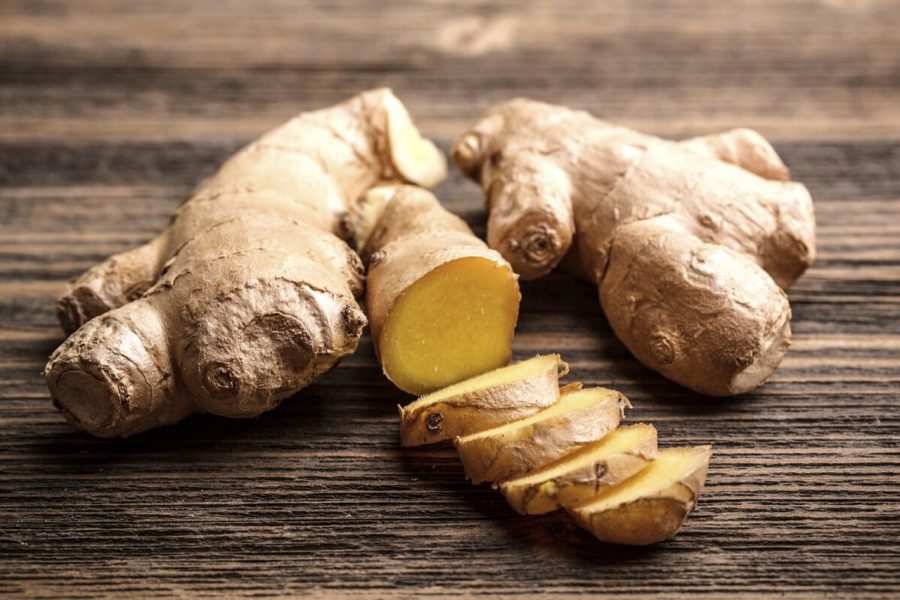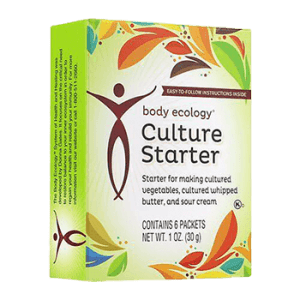
The little-known benefits of ginger: Can it boost your microbiome?
Ginger, a member of the Zingiberaceae family, is a global spice with a long history of medicinal application. Popular in alternative medicine, the benefits of ginger are extensive. It’s been used to relieve gastrointestinal ailments and shown in studies to have anti-inflammatory, antioxidant, antitumor, and antiulcer effects.1
Pro tip: Add raw ginger to your favorite gut-supporting cultured veggie recipe.
Ginger’s impact on the microbiome could be outstanding for some, potentially remodeling it and altering its effectiveness at mitigating other diseases and ailments.
What are the health benefits of ginger?
Ginger, a flavorful root or rhizome, has a spicy aroma and taste.
Ginger and other rhizomes have been used since antiquity to help treat cold, fever, sore throats, infectious diseases, arthritis, rheumatism, sprains, muscular aches, pains, cramps, hypertension, dementia, migraine, nervous diseases, gingivitis, toothache, asthma, stroke, and diabetes.2
They’ve also been used as a home remedy in helping to treat various gastric ailments, like constipation, diarrhea, dyspepsia, belching, bloating, gastritis, epigastric discomfort, gastric ulcerations, indigestion, nausea, and vomiting.2
Studies have found that other benefits of ginger include:
- It protects the stomach from ulcer-causing agents like aspirin.3
- Ginger also acts a carminative, helping to decrease gas production.4
- This spice may help enhance your microbiome because it increases the motility of the gastrointestinal tract, expediting the rate at which the stomach empties.5
If you’re looking for a good source of antioxidants, ginger may help. Working as an antioxidant and anti‐inflammatory, ginger may improve enzymatic activity and impairments in the anti‐inflammatory system in different tissues, without side effects.6 Despite the benefits of ginger, it’s important to remember that everything has a front and a back side to it, and the Principle of Uniqueness also comes into play.
Check out an easy way to increase your ginger intake with these tasty recipes.
How does ginger help your gut?
Gut microbiota can be altered by dietary interventions with ginger because it contains exosome microRNAs and has carminative properties. Ginger is incorporated into bacteria in the gut (i.e., Lactobacilli) — multiplying the good bugs to the point where they can make anti-inflammatory cytokines, improving severe gut disease.7
Ginger may actually be powerful enough to remodel the microbiome. Exosome-like nanoparticles (ELNs) — small extracellular vesicles that often contain RNA derived from plants, such as ginger — can activate a pathway that triggers the expression of the cytokine IL-22 in colon mucus.7 IL-22 has been shown in other studies to promote tissue repair at the gut lining.
Studies show ginger supplementation modified the composition of the gut microbiota, resulting in its effects against obesity, insulin resistance, live steatosis, and low-grade inflammation.8 It has also shown effectiveness at decreasing pressure on the lower esophageal sphincter, reducing intestinal cramping, and preventing dyspepsia, flatulence, and bloating.6
For some, however, ginger might affect salicylates sensitivity:
- Ginger is one of the top salicylates.
- Salicylates sensitivity (or intolerance) is less common than others, like gluten or lactose intolerance, but is still very real.
- It’s also one of the hardest to identify since the compound (salicylates) is derived from salicylic acid (naturally and synthetically) and is in foods, medications, and other products.
Plants produce salicylates to defend against harmful elements, like insects, fungus, and disease.9 Salicylates in the natural form are found in foods like fruits, vegetables, coffee, teas, nuts, spices, and honey. In the synthetic form, salicylates are in medications like aspirin.
A sensitivity is thought to be caused by an overproduction of leukotrienes, inflammatory mediators linked to conditions like asthma, rheumatoid arthritis, and bowel disease.9 People with salicylates sensitivity are unable to consume small amounts of this compound without experiencing negative side effects.
What can you do about salicylate sensitivity?
Health is the natural state of your body. When negative symptoms show up or persist, it’s because something present in the body is inhibiting the healing response. Before your body can utilize the positive things you give yourself, it must first remove the damaging culprits disrupting your body’s healing response and preventing repair.
Health hijackers are responsible for chronic illness, aches and pains, advanced aging, and health challenges (and annoyances) like sensitivities or intolerances. Addressing them and eradicating them from your body is the most direct way to free yourself from acute or chronic complaints.
It could be possible to mitigate a sensitivity or intolerance to salicylates with detoxification. Again, it will depend greatly on your unique case.
By conquering your health hijackers through detoxification, you may be able to add in foods you have temporarily given up due to insensitivities. Detoxification may potentially help your body fight infection, inhibit allergic reactions, eliminate free radicals that advance aging, lower “bad” cholesterol, raise “good” cholesterol levels, and maintain a healthy weight.
Ginger supplementation is only part of the equation of a healthy and diverse gut microbiome. Your genetic composition plays an important role too, along with developing better nutrition through eating a balanced diet (80 percent vegetables and 20 percent animal protein) that’s tailored to your unique needs.
REFERENCES:
- 1. Bodagh, M. N., Maleki, I., Hekmatdoost, A. (2018, November 5). Ginger in gastrointestinal disorders: A systematic review of clinical trials. Wiley Online Library.
- 2. Giacosa, A., Morazzoni, P., Bombardelli, E., Riva, A., Bianchi Porro, G., Rondanelli, M. (2015). Can nausea and vomiting be treated with ginger extract. Eur Rev Med Pharmacol Sci, 19(7), 1291-6.
- 3. Wang Z, Hasegawa J, Wang X, et al. Protective Effects of Ginger against Aspirin-Induced Gastric Ulcers in Rats. Yonago Acta Med. 2011;54(1):11-19.
- 4. Nikkhah Bodagh M, Maleki I, Hekmatdoost A. Ginger in gastrointestinal disorders: A systematic review of clinical trials. Food Sci Nutr. 2018;7(1):96-108. Published 2018 Nov 5. doi:10.1002/fsn3.807.
- 5. Wu KL, Rayner CK, Chuah SK, Changchien CS, Lu SN, Chiu YC, Chiu KW, Lee CM. Effects of ginger on gastric emptying and motility in healthy humans. Eur J Gastroenterol Hepatol. 2008 May;20(5):436-40. doi: 10.1097/MEG.0b013e3282f4b224. PMID: 18403946.
- 6. Tramontin, N. dos S., Luciano, F., Marques, S. de O., Souza, C. T. de, & Muller, A. P. (2020, January 27). Ginger and avocado as nutraceuticals for obesity and its comorbidities. Wiley Online Library.
- 7. Teng, Y., Ren, Y., Sayed, M., Hu, X., Lei, C., Kumar, A., … Zhang, H.-G. (2018, November 14). Plant-Derived Exosomal MicroRNAs Shape the Gut Microbiota.
- 8. Wang, J., Wang, P., Li, D. et al. Beneficial effects of ginger on prevention of obesity through modulation of gut microbiota in mice. Eur J Nutr 59, 699–718 (2020).
- 9. Duthie, G. G., & Wood, A. D. (2011, September). Natural salicylates: foods, functions and disease prevention.









